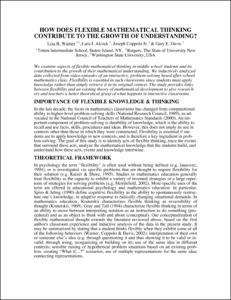Please use this identifier to cite or link to this item:
http://hdl.handle.net/20.500.12164/70| Title: | How does flexible mathematical thinking contribute to the growth of understanding? |
| Authors: | Warner, Lisa B. Alcock, Lara J. Coppolo, Joseph, Jr. Davis, Gary E. |
| Keywords: | Education |
| Issue Date: | 2003 |
| Publisher: | International Group for the Psychology of Mathematics Education |
| Citation: | Warner, L.B., Alcock, L. J., Coppolo Jr., J. & Davis, G. E. (2003). How does flexible mathematical thinking contribute to the growth of understanding? In N.A. Pateman, B.J. Dougherty & J. Zillox (Eds.), Proceedings of the Twenty-Seventh Conference of the International Group for the Psychology of Mathematics Education held jointly with the Twenty-fifth Conference of the National Group for the Psychology of Mathematics Education, Honolulu, Hawaii, 4, 371-378. |
| Abstract: | We examine aspects of flexible mathematical thinking in middle school students and its contribution to the growth of their mathematical understanding. We inductively analyzed data collected from video-episodes of an interactive, problem-solving based after-school mathematics class. Flexibility is essential in such classrooms since students must apply knowledge rather than simply retrieve it in its original context. The study provides links between flexibility and an existing theory of mathematical development to give researchers and teachers a better theoretical grasp of what happens in interactive classrooms. |
| Description: | This paper was presented at the Joint Meeting of the International & National Group for the Psychology of Mathematics Education (PME27/PMENA25) 27th Annual Conference in Oahu, Hawaii. |
| URI: | http://hdl.handle.net/20.500.12164/70 |
| Appears in Collections: | Education |
Files in This Item:
| File | Description | Size | Format | |
|---|---|---|---|---|
| Warner, Alcock, Coppolo, Dav PME 2003.pdf | paper | 960.2 kB | Adobe PDF |  View/Open |
Items in DSpace are protected by copyright, with all rights reserved, unless otherwise indicated.
